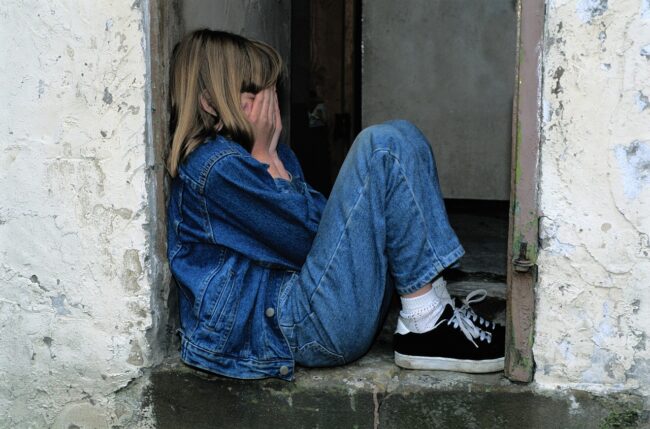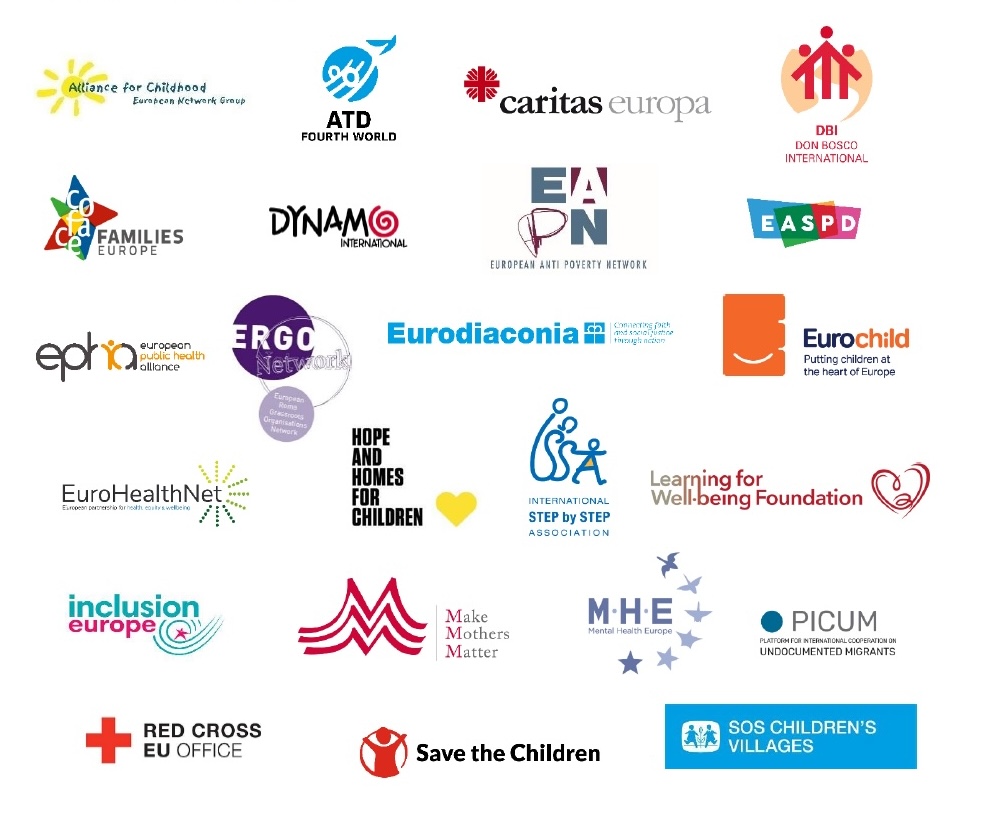Child and family poverty a political choice not an inevitability
28.04.25
Make Mothers Matter in a joint statement of the EU Alliance for Investing in Children, calls for a Europe that protects every child, by aligning EU’s policies and budget to eradicate child poverty.

Child poverty is a growing crisis in Europe, affecting 20 million children (24.8%), significantly more than adults (20.6%). Despite existing efforts, systemic failures have allowed poverty to persist and deepen, with profound economic, social, and health consequences for individuals and societies. The issue is not only moral but also economic, costing up to 3.4% of GDP across OECD countries annually.
The persistence of child poverty reflects a collective systemic failure with severe socio-economic, health, fiscal, and security consequences across Europe. The impact extends beyond education and employment – poverty is one of the key contributing factors to family separation, resulting in children being placed in alternative care, which further damages their prospects and perpetuates the cycle of poverty.
Key Issues
- Rising Child Poverty: From 2019 to 2023, the numbers of children at risk increased from 19M to nearly 20M, largely due to the COVID-19 aftermath, cost-of-living crisis, and climate change.
- Widening Inequalities: Vulnerable groups—including Roma, migrants, children with disabilities, and those in alternative care—face systemic exclusion, intensifying their disadvantages.
- Uneven Geography: Even in affluent areas, child poverty is significant, and social support often fails to reach those most in need.
- Underinvestment: Despite high returns from early interventions, political focus remains on short-term economic recovery over long-term social investment.
Policy Opportunities
The EU now has the tools to drive transformative change through:
- European Child Guarantee: Ensure access to essential services for vulnerable children.
- Revised European Pillar of Social Rights (EPSR) and EU Anti-Poverty Strategy: Prioritise child and family poverty.
- Multiannual Financial Framework (MFF): Provide critical EU-level funding to scale up innovative, cross-border solutions that national budgets alone cannot sustain.
The European Child Guarantee – Driving Positive Change in the EU
The European Child Guarantee is a landmark EU initiative aimed at breaking the cycle of child poverty and social exclusion by ensuring access to essential services—such as education, healthcare, housing, and nutrition—for children in vulnerable situations. It is both a preventive and interventionist policy tool that seeks to address immediate needs while tackling structural inequalities.
The European Child Guarantee represents a once-in-a-generation opportunity to combat child and family poverty and social exclusion. By adopting the European Child Guarantee Recommendation, Member States made a historic commitment to ensure access to essential services such as healthcare, education, housing, and nutritious food for children living in vulnerable situations. By specifically focusing on children in vulnerable situations, the instrument aims to break the cycle of poverty and improve opportunities for those most at risk of exclusion. The policy has the potential to serve as both a preventive and an intervention tool, addressing immediate needs while tackling the structural barriers that perpetuate social exclusion.
Well-designed social protection systems are key tools in reducing child poverty by directly supporting families with children. Numerous studies show the positive impact of such policies, not only in lowering child poverty rates but also in enhancing the overall social inclusion of families. These systems promote the full participation of children and their families in society, ensuring equitable opportunities and helping to break the intergenerational cycle of poverty. The root causes of child poverty are addressed by providing adequate financial support and ensuring free access to essential and social services, including early childhood education, free school meals, healthcare, and family support services. Because child poverty stems from family poverty.
Social protection measures act as preventive mechanisms, enabling families to avoid poverty and reducing the likelihood that children will experience deprivation, inadequate living conditions, or separation from their families. A well-functioning and equal welfare state not only reduces income inequality through redistribution but also strengthens economic stability by buffering the negative effects of economic shocks on employment and consumption.
 Strengthening the Child Guarantee
Strengthening the Child Guarantee
Despite its promise and early successes, several gaps must be addressed to unlock its full potential:
- Weaknesses in National Action Plans (NAPs):
Many NAPs lack specific targets, data, and funding. Some fail to implement promised actions or introduce new measures. - Exclusion of Vulnerable Groups
Many children—e.g. single parent homes, undocumented migrants, Roma, those with disabilities or in care—face legal/administrative barriers to services. - Fragmented Monitoring
Monitoring efforts often aren’t aligned with national poverty frameworks, reducing accountability and clarity. - Insufficient Stakeholder Engagement
Civil society and children are frequently sidelined in planning and evaluation.
Integrated EU Social Agenda to Combat Child Poverty
The document advocates for a comprehensive, integrated, and rights-based approach to eradicating child and family poverty within the EU. It emphasises leveraging upcoming revisions of the European Pillar of Social Rights (EPSR) Action Plan and the launch of an EU Anti-Poverty Strategy as critical opportunities.
Key Recommendations:
- Promoting multi-sectoral coordination across social, health, education, climate, housing, fiscal, and economic policies to ensure systemic change.
- Addresss structural causes like housing insecurity, educational inequalities, and wage disparities with a preventive and intersectional approach.
- Link the Anti-Poverty Strategy with the Multiannual Financial Framework (MFF) to guarantee sustained investments.
- Embed child poverty reduction into all relevant EU strategies and social policy reforms.
- Introduce child-sensitive funding targets and a Child Marker to improve tracking, transparency, and impact assessment.
- Ensure inclusion of vulnerable groups, such as single-parent households, Roma, children with disabilities, children experiencing homelessness, children in alternative care, by eliminating legal and administrative barriers to services.
- Strengthen monitoring, participation, and accountability.
- Invest in social protection: Strengthen social protection systems as effective tools to reduce child poverty and support inclusive development. For MMM parents are not just service users—they are essential partners in children’s development
- Prioritise early intervention (especially during the first 1,000 days), education, housing, and healthcare. Research continues to show that investments made during early childhood yield the highest returns, with long-term benefits for children, families, and societies. The European Commission’s 2024 Employment and Social Developments in Europe (ESDE) report highlights that an additional €11 billion annually is needed to meet early childhood education and care targets—a figure that underscores the scale of both the problem and the opportunity.
For MMM high-quality early childhood education and care (ECEC) is a lifeline for vulnerable families. It supports children’s cognitive, emotional, and social development, while also enabling mothers—who still disproportionately carry caregiving responsibilities—to participate in the workforce and access training. Yet many children still lack access due to insufficient funding, legal barriers, or lack of recognition of informal caregiving roles, often played by mothers and extended family members.
Conclusion
Child poverty has lifelong consequences, entrenching inequality and limiting opportunity. While the EU has the tools, policies, and budget to eradicate it. Child poverty in the EU is a political choice not an inevitability.
At Make Mothers Matter, we believe the EU must place children and their families at the centre of its political and financial priorities, especially in the Anti-Poverty Strategy, EPSR Action Plan, and Child Guarantee. Now is the time for binding commitments, not just declarations—children need action, funding, and cross-sectoral coordination now.
Access the full statement here
The New EU Gender Equality Roadmap : A Call for Inclusion of Mothers
04.03.25
The European Commission’s initiative on a new Gender Equality Roadmap post-2025, marks a significant step forward in addressing gender disparities across the European Union. Make Mothers Matter (MMM
Breaking the Cycle: Gender Equality as a Path to Better Mental Health
18.03.25
The Council of the European Union has taken a decisive step in recognising the vital connection between gender equality and mental health.
Europe Must Listen to Mothers: Our landmark report heads to the European Parliament
28.08.25
On 22 September 2025, the voices of mothers will take centre stage in Brussels. For the first time, Make Mothers Matter (MMM) will present its State of Motherhood in Europe









